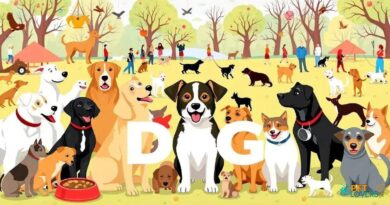O que é fidelidade do cão
Understanding Canine Loyalty
Canine loyalty, often described as the unwavering bond between dogs and their human companions, is a profound aspect of dog behavior. This loyalty is not merely a trait; it is a complex emotional connection that develops over time through trust, companionship, and shared experiences. Dogs are pack animals by nature, and their loyalty stems from their instinctual need to belong to a social group, which, in a domestic setting, is often their human family.
The Science Behind Canine Loyalty
Research in animal behavior has shown that dogs possess an extraordinary ability to form attachments. This attachment is facilitated by the release of oxytocin, often referred to as the “love hormone,” during interactions between dogs and their owners. This biochemical response reinforces the bond, making dogs feel secure and loved, which in turn enhances their loyalty. Understanding this scientific basis helps us appreciate the depth of the relationship we share with our canine friends.
Factors Influencing Dog Loyalty
Several factors influence the level of loyalty a dog exhibits towards its owner. These include the dog’s breed, upbringing, and the quality of the relationship with the owner. For instance, breeds known for their companionship, such as Golden Retrievers and Labrador Retrievers, often display higher loyalty levels. Additionally, a dog raised in a nurturing environment with consistent training and socialization is more likely to develop a strong bond with its owner.
Signs of a Loyal Dog
Recognizing the signs of a loyal dog can enhance the bond between pet and owner. Loyal dogs often exhibit behaviors such as following their owners around the house, seeking physical closeness, and displaying protective instincts. They may also show excitement upon their owner’s return, regardless of how long they’ve been apart. These behaviors are indicators of a strong emotional connection and a deep sense of loyalty.
The Role of Training in Fostering Loyalty
Training plays a crucial role in fostering loyalty in dogs. Positive reinforcement techniques, such as rewarding good behavior with treats or praise, help build trust and strengthen the bond between dog and owner. Consistent training not only teaches obedience but also enhances the dog’s confidence, making them feel secure in their relationship with their owner. This security is a key component of loyalty.
Building Loyalty Through Quality Time
Spending quality time with your dog is essential for building loyalty. Engaging in activities such as walks, playtime, and training sessions creates shared experiences that deepen the bond. Dogs thrive on attention and interaction, and the more time you invest in your relationship, the more loyal your dog will become. This mutual enjoyment fosters a sense of belonging and loyalty.
The Impact of Separation on Canine Loyalty
Separation can significantly impact a dog’s loyalty. Dogs are sensitive creatures, and prolonged absences can lead to anxiety and insecurity. This can manifest in behaviors such as excessive barking, destructive chewing, or withdrawal. Understanding how separation affects your dog’s emotional state is crucial in maintaining their loyalty. Strategies such as gradual desensitization to alone time can help mitigate these effects.
Canine Loyalty Across Different Breeds
While all dogs are capable of loyalty, different breeds exhibit varying degrees of this trait. Herding breeds, like Border Collies, often display loyalty through their protective instincts, while toy breeds may show loyalty through companionship and affection. Understanding the unique characteristics of your dog’s breed can help you nurture their loyalty in ways that resonate with their natural instincts.
Challenges to Canine Loyalty
Various challenges can affect a dog’s loyalty, including trauma, neglect, or inconsistent treatment. Dogs that have experienced abuse or abandonment may struggle to trust and bond with new owners. It is essential to approach such situations with patience and understanding, allowing the dog to rebuild trust at their own pace. Professional training and socialization can also aid in overcoming these challenges.
The Lifelong Journey of Canine Loyalty
Canine loyalty is not a static trait; it evolves throughout a dog’s life. As dogs age, their loyalty may manifest differently, influenced by changes in health, environment, and lifestyle. Maintaining a strong bond requires ongoing effort, understanding, and adaptation to your dog’s needs. By nurturing this loyalty throughout their life, you ensure a fulfilling and loving relationship that stands the test of time.




